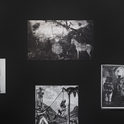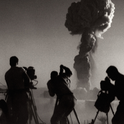If not quite a whirlwind, Victor Martinovich’s debut novel Paranoia has certainly stirred up a few gusts of interest, not least with the Belarusian state authorities. After two days in the bookshops in 2009, it disappeared. A story of doomed love and police-surveillance set against the backdrop of a lightly fictionalised Minsk, the book has now resurfaced in an English translation by Diane Nemec Ignashev, published by Northwestern University Press.
Making the most of its publication history, the English edition of Paranoia comes saddled with a somewhat naff blurb, urging the reader “not to read this book,” because “any unsanctioned comparisons with historical figures alive today may be qualified as a criminal offence punishable under national and international law.”
The immediate question becomes, therefore, do the contents live up to the bombast? Or is Paranoia just another addition to the list of banned books whose literary merits fail to match the subject matter?
In her foreword, Nemec Ignashev offers flattering comparisons to a retinue of literary and cultural figures, many of whom Martinovich namechecks within the text itself. The practice is justified by the fact that the protagonist, Anatoly, is a writer.
But even so, invocations of Freud and Dali, Borges and Kafka—often within consecutive sentences—can be a bit much. Anatoly and his lover, Lisa (whose other association is with Nikolai Muriavov, hegemonic chief of the security services), aren’t short of reference points for their relationship either: Romeo and Juliet, Adam and Eve, even the free-wheeling, eight-limbed double people described in Plato’s Symposium.
But the fact that none of these comparisons is really sustained can make the enterprise seem a little hollow. “Why is it that every love story contains the potential to be not realised in real life?” complains Anatoly. The question suffers not only from stylistic clumsiness—perhaps a fault of the translation—but also a dismal predictability.
Donald Rayfield in the Times Literary Supplement described Paranoia as both “Orwellian” and “Donnersmarckian” (the latter a reference to The Lives of Others, the 2007 film set in East Germany), and it is true that one of the fascinations of this book is that its representations of a totalitarian state are underpinned by a presently existing, European, dictatorship. Indeed, the silence and relative invisibility of Belarus is peculiar. Alexander Lukashenko, country’s 59 year-old dictator, has been consolidating his rule since 1994, helping to construct a contemporary state that is at once fantastical and real, complete with all the warped surrealism of Soviet-style disappearances and a flexible approach to historical fact.
As Timothy Snyder notes in his glowing introduction, the Lukashenko regime openly admits to faking election results, the caveat being that they are supposedly faked in the opposition's favour: a sporting gesture that seems inadvertently to acknowledge the silent “pseudo” prefixing Belarusian “democracy.”
Martinovich, deputy editor of the weekly Belarusian newspaper BelGazeta, teaches in Lithuania and wrote his novel in Russian, ostensibly as a pre-emptive safeguard against censorship. "Earlier it was considered that everything that was possible in Russia was possible for us,” Martinovich has written. The fact that his book has become the first Russian-language fictional work ever to be banned in Belarus seems to mark an unusual sensitivity on the part of the censor, if not simply the accidental work of low-level administrative “idiots,” as he himself has suggested.
All this has been used to justify the significance of the book to an English-language audience. But the question of where the emphasis falls in the term “dissident literature”—on the dissidence or the literature?—is unavoidably present here.
A glance at the canon would suggest that the correlation between social impact and creative merit is fairly inconsistent: on top of its anger, One Day in the Life of Ivan Denisovich articulates the longing for nicotine like nothing else, but Uncle Tom's Cabin was hardly a revolution in form.
Perhaps Paranoia's signal achievement is its disruption of coherent social identities—the depiction of Anatoly as a solipsistic, underground man serves to augment his unwilled involvement with the machinery of state and authority. Anatoly’s kaleidoscopic absorption of sights and sounds mirrors the feeling of panoptical observation. The frequent references to the physicality of writing, the image of always being “lost already under a pile of words” reminded me less of the authors to which Martinovich alludes than the prologue of Andrei Sinyavsky’s The Trial Begins, banned in Soviet Russia, where an anonymous policeman “in plain clothes…ran his hand over the first page and, presumably by way of censorship, scooped up all the characters and punctuation marks.”
In its ungainly directness, Paranoia wobbles between profundity and melodrama. The writing sometimes threatens to sink under its own weight—and when Anatoly becomes tiresome, so does the book. The second section, composed entirely of surveillance transcripts, is lumbered with some unconvincing soliloquies, as if the form were not at ease with itself. But the claim that “real pain is never melodic” is a mitigating one, making sense of the overexcitement of the prose.
By the final part of the novel, when the plot at last develops some real direction, one has the sensation of a strong piece of work whose central indictment—that even under total surveillance, no story can be anything other than a version of events—is a compelling one.
States of delusion
Paranoia, Victor Martinovich’s debut novel is banned in his home country of Belarus–is it worth the fuss?
July 14, 2013

Belarus: Europe's last dictatorship











